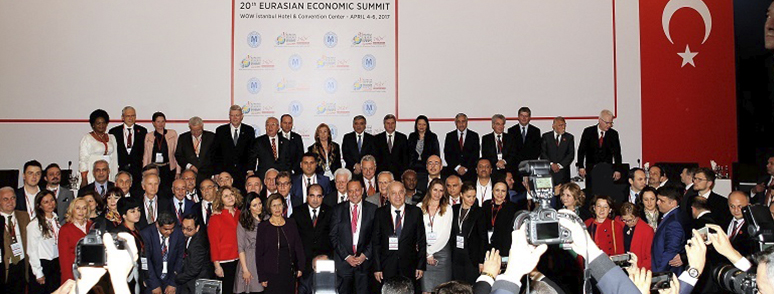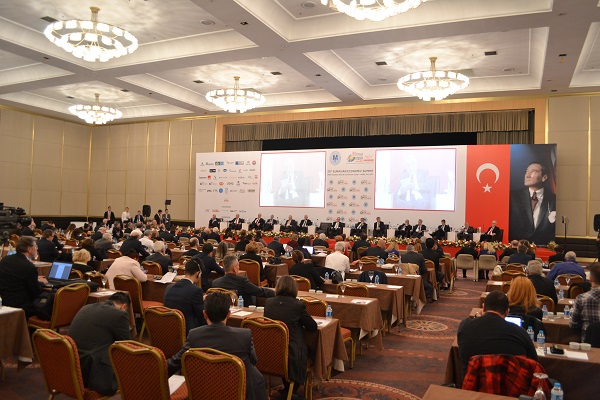Final Declaration reflecting the common thoughts of the participants after the 20th Eurasian Economic Summit; It was published under the title “Call for Humanity”.
With respect to your attention, we submit the Final Declaration sent to the world’s leading non-governmental organizations, the UN General Secretary, the Summit participants, the international organizations which are the partners of the Marmara Group Foundation and the presidency of our country and the executives of our country:
Call for Humanity
This year, the 20th Eurasian Economic Summit was held in Istanbul on 4-6 April 2017; Albanian President Bujar Nishani, President Gjorge Ivanov of Macedonia, President Mladen Ivanic of Bosnia and Herzegovina, President Mustafa Akıncı of the Turkish Republic of Northern Cyprus and Irina Vlah, President of Moldova-Gagavuzya Autonomous Region.
In addition, three previous Prime Ministers were present at the 20th Eurasian Economic Summit. Polish Deputy Prime Minister Grzegorz Kolodko, Romanian Prime Minister Victor Ponta, together with Slovenian Prime Minister Alenka Bratušek, former Presidents of Turkey Abdullah Gul Bamir Albania’s Topi Heinz Austria Fischer, Petra from Moldova Lucinsch is from Romania, Emil Constantinescu, Stjepan Mesic from Croatia, Ivo Josipovic, Valdis Zatlers from Latvia, and Boris Tadić from Serbia at the 20th Eurasian Economic Summit. 323 foreign guests, including ministers, ex-ministers, ambassadors, businesswomen, businessmen, academics and clergymen, honored the 20th Eurasian Economic Summit.
We have decided to present the results of the 20th Eurasian Economic Summit, which focuses on the future of the European Union, sustainable energy, refugee problem, rising nationalism and populism, neoliberal economy and global terrorism, with the humanity of the United Nations and to share it with humanity.
When we look at the socio – political developments that affect the whole world today, the question comes to our mind whether humanity is in a crossroads.
Emerging nationalism, populism, refugee flows, foreign intervention in the Middle East in the target of reaching energy resources and the fluctuations in the markets, violence, poverty, discrimination, political pressure have become important problems of the era. Societies live at risk of threat, disintegration and losing their identity.
Leaders forget their responsibilities, human values and are swiftly swept to populism.
The development of these radical movements has led to the proliferation of non-governmental, non-state actors in all parts of the world, and concerns about the future.
Our world must have come to this point because we have not undertaken our responsibilities and neglected our duties.
Global institutions, such as the European Union and the United Nations, whose importance and value are accepted, have not been able to adapt to the changing conditions of the world. The use of protective measures in the economy disproved existing structures. The use of populism, which appears to be an “easy remedy” in difficult situations, has raised the dangers. It was forgotten that ideas and policies such as populism, racism and discrimination did not bring happiness and prosperity to societies. For this and similar reasons, the whole world was faced with difficulties.
Europe, which is under threat of fragmentation with emerging nationalism currents; the East – West, Christian – Muslim campaigns in world politics; a policy pursued with an emphasis on the perceptions of enemies through ethnic and religious identities; we have to question whether he will take the world to a third world war.
When things become war, there is not much left to do. The choices we make today will play an important role in the fate of the world and humanity.
20TH EURASIAN ECONOMY SUMMIT


Humanity is at a road junction
Humanity is at a road junction. Maybe we’re at the last stop, maybe we have one last chance we haven’t used yet.
The crisis of the EU is shaking the basic principles of its establishment. A strong and democratic Europe is needed for stability and development. Member States have not succeeded in making joint decisions together, and have moved away from the founding principles.
In Europe, which cannot create new policies, new ideas, new visions and strategies in the face of new problems, the emergence of radical movements such as populism and anti-Islamism cannot be prevented when every country tries to solve its solutions with its own traditional policies. The borders were closed in the face of the refugee flows and the walls were eroded.
At this point, the current consensus formula within the European Union, “discourse at different speeds, but staying together”, “multi-speed Europe”, as well as Eastern European countries, “This situation can mean different membership class”, “3-4 countries all decide for Europe “with such judgments. These concerns also question the sustainability of today’s consensus formula.
Unexpected developments in the world show that the integration in Europe must continue for the security and peace of this region. Urgent institutional reforms are needed in this area. Europe should abandon its protectionist policies and give priority to the rules of the markets themselves. An EU ethics should be established within the framework of economic and military projects. European construction that respects cultural and ethnic identities should be targeted. Europeans who himself has become a new social contract in time to prevent a return to the past history of Turkey and the Balkans. The European Union should now define itself as “Europe” with these countries.
The world should internalize the refugee problem
It is inevitable for extraordinary problems to produce surprising results. The war in Syria has left Europe facing an immigration problem. Turkey and the EU have been exposed to a heavy pressure refugees. If new solutions and policies are not created with a new perspective, this problem will become more and more severe. The problem of migration and refugee should be dealt with together with economic, political and environmental reasons. The fact that the EU is able to maintain its presence as a global player in consensus depends on its attitude in this and other major crises. Since the disappearance of the migration and refugee crisis will be possible with the elimination of its causes, Europe must be able to produce fast and accurate solutions that demonstrate its global strength and dignity.
Partnership in the fight against global terrorism
The 21st century. a new terror problem in front of humanity. We are experiencing a global terror that is different from the past. We also find it wrong to define global terrorism as a “clash of Civilizations”. False and incomplete definitions also negatively affect the fight against terrorism. The fight against terrorism can be done primarily through the elimination of the causes of terrorism. Military interventions may not always be enough to get the result. The real reason for terrorism is the economy. The unequal distribution of income between the small, rich layer and the Big poor group, which receives the largest share of World income, is classical selfishness… the false policies followed to capture energy resources. They are the ambitions of the powerful to redraw maps in their own interests.
Economics is a whole in the world and globalized. However, each country continues its traditional policy of giving priority to its own economic interests. The national economy should be considered before the interests of the “peace” policy is. We must insist on mutual negotiations for acceptable solutions to economic conflicts of interest. To achieve this, we must create a global awareness. The point is that capitalism needs radical reform. It is obvious that neoliberalism, both economically and socio-culturally, drives the world into crisis. This ideology must now go to the garbage of history. But we must not allow nationalism to be replaced by neoliberalism. Otherwise, it would be a bigger disaster. The global awareness of this will strengthen the fight against global terrorism. We call for the protection of democratic standards in the fight against terrorism, the introduction of new legal structures, and the implementation of global joint sanctions against countries that support terrorism.
Source: Marmara Foundation Group
